Brahman: Absolute Consciousness in Advait (Non Dual) Vedanta Philosophy
Key Terms
- Brahman
- Maya
- Witness Consciousness
- Non-dual (Advait) Vedanta Philosophy
- Philosophy
- Vedic Philosophy
- Subject Object
- Subject Subject
- Subject Meta-Subject
- Absolute Consciousness
- Phenomenal Consciousness
- Turiya
- Awareness
- Adi Shankara
- Sakshi
- Akash and Prakash
- Mayavad
- Truth, Value and Freedom
Source: “Contemporary Interpretations of Shankara’s Advaita and the Affirmation of the World.”
Bhattacharyya’s most remarkable idea is his notion of the Absolute as alternation. Instead of the Hegelian absolutization of the Absolute, he chose the dialectics of alternation both at transcendental and empirical levels of reality. The triple functions of consciousness in relation to its contents are: knowing, feeling, and willing. Each of them has its own formulation of the Absolute, namely truth, value, and freedom respectively. When cognition is given importance, the Absolute is viewed as truth; when emotion (devotion) is given importance, it is viewed as value; and when volition is given importance, it is viewed as freedom. These conceptions of the Absolute cannot be unified into one, because each is Absolute in turn.7 For Bhattacharyya, this alternation is not just our symbolic speakingabout the one Absolute in three distinct ways, but the very constitution (dynamics) of the Absolute.8
Source: “Contemporary Interpretations of Shankara’s Advaita and the Affirmation of the World.”
The idealist view of life and reality, which Radhakrishnan calls religion of the spirit, perceives the universe as ultimately spiritual. Brahman (Atman/ the Spirit) being the ultimate truth and the universe its self-manifestation, the spirit is our deepest self.
Radhakrishnan wanted all historical religions to transform themselves into the religion of the spirit, a spiritual vision that transforms the world and ensures human unity, universal moral order, and world peace.
Radhakrishnan tried to work out a positive account of the world by interfacing three concepts – Brahman (the Absolute), Ishvara (God), and the world. Brahman considered in its self-identity as pure consciousness is beyond all distinctions, qualifications, and descriptions. This one, absolute being, however, manifests itself as the world. The world is just one possibility of Brahman’s self-manifestation; other possibilities we may not know.
Brahman in its relation to the world is Ishvara (God). Ishvara is Brahman’s creative aspect, conceived as creator, redeemer, and judge. Immanent in the world, Ishvara guides and transforms it. Ishvara lasts as long as the world-process lasts. Although the transformation of the world is God’s action, it is essentially linked with human transformation. Despite limitations, human evolution and progress is teleological and moves toward a greater good.10 Human calling is to co-operate with the divine plan for the world’s transformation.
Typical of an Advaitin, Radhakrishnan held that our deepest self (atman) is identical to the transcendental Self (Atman) and is above transmigration. What is subject to transmigration is jiva, the empirical self. The world-process lasts until all jivas are liberated.11 When all jivas are liberated, the world will be transformed into Brahma-loka (the kingdom of God). The world and all jivas become one with God and God will be all in all. And finally the Brahma-loka, along with Ishvara, will lapse into Brahman. Thus Brahman remains the beginning and the end of the world. If and when another world-process begins is left to the freedom of Brahman.
“Contemporary Interpretations of Shankara’s Advaita and the Affirmation of the World.”
Source: “Contemporary Interpretations of Shankara’s Advaita and the Affirmation of the World.”
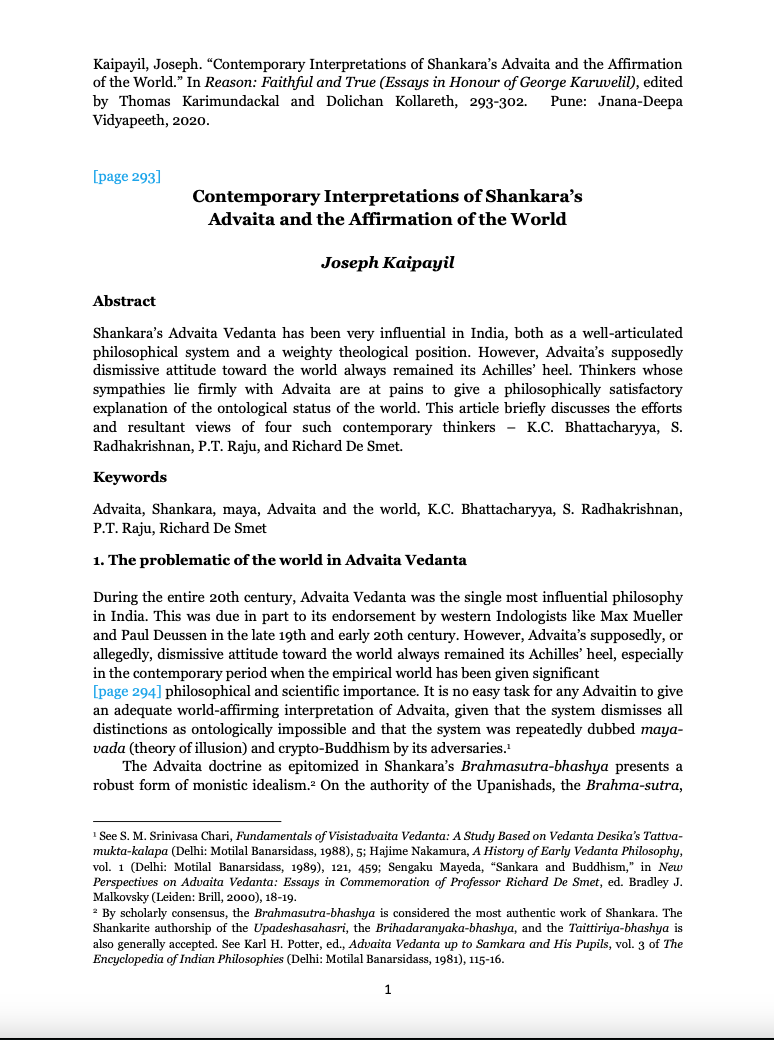
Source: “Contemporary Interpretations of Shankara’s Advaita and the Affirmation of the World.”
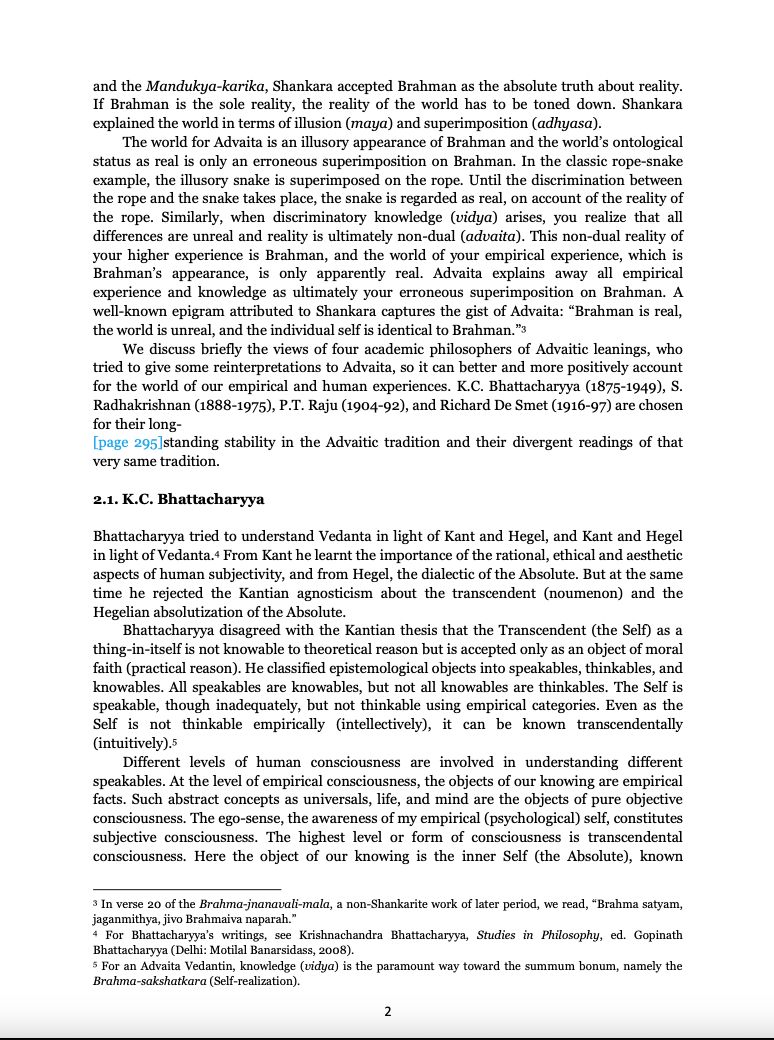
Source: “Contemporary Interpretations of Shankara’s Advaita and the Affirmation of the World.”

Source: “Contemporary Interpretations of Shankara’s Advaita and the Affirmation of the World.”

Source: “Contemporary Interpretations of Shankara’s Advaita and the Affirmation of the World.”

Source: “Contemporary Interpretations of Shankara’s Advaita and the Affirmation of the World.”

Source: “Contemporary Interpretations of Shankara’s Advaita and the Affirmation of the World.”

Source: “Contemporary Interpretations of Shankara’s Advaita and the Affirmation of the World.”
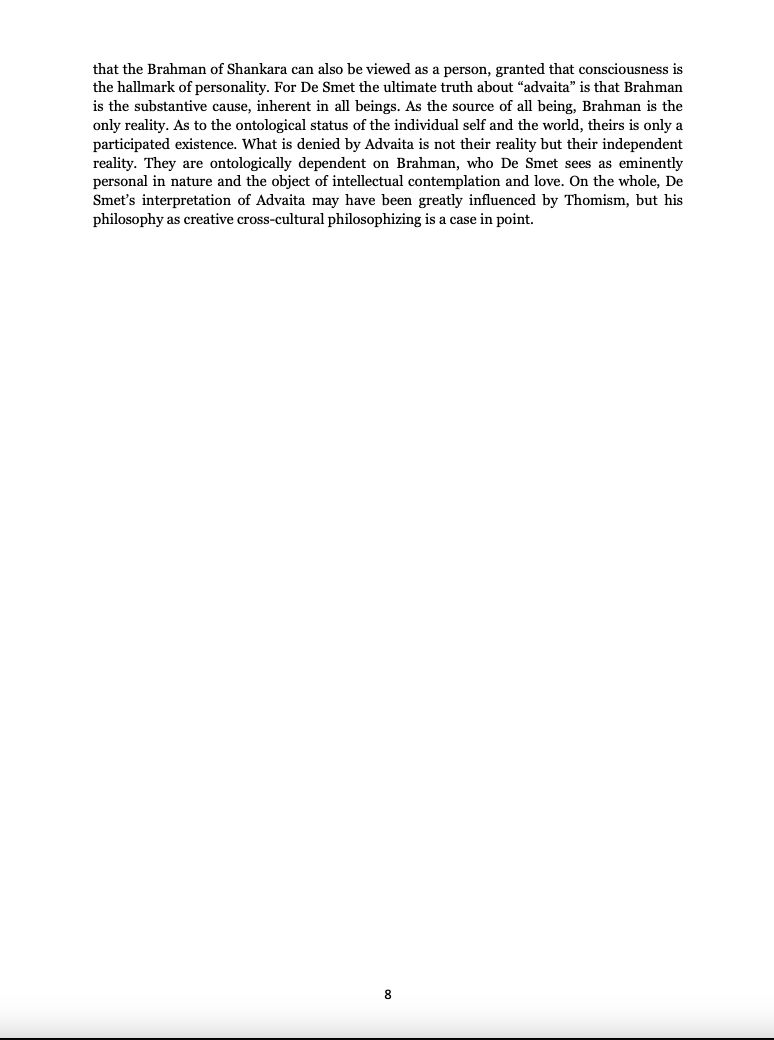
Advaita and the philosophy of consciousness without an object
Source: Advaita and the philosophy of consciousness without an object

Source: Advaita and the philosophy of consciousness without an object

Source: Advaita and the philosophy of consciousness without an object

Source: Advaita and the philosophy of consciousness without an object

Source: Advaita and the philosophy of consciousness without an object

Source: Advaita and the philosophy of consciousness without an object

Source: Advaita and the philosophy of consciousness without an object
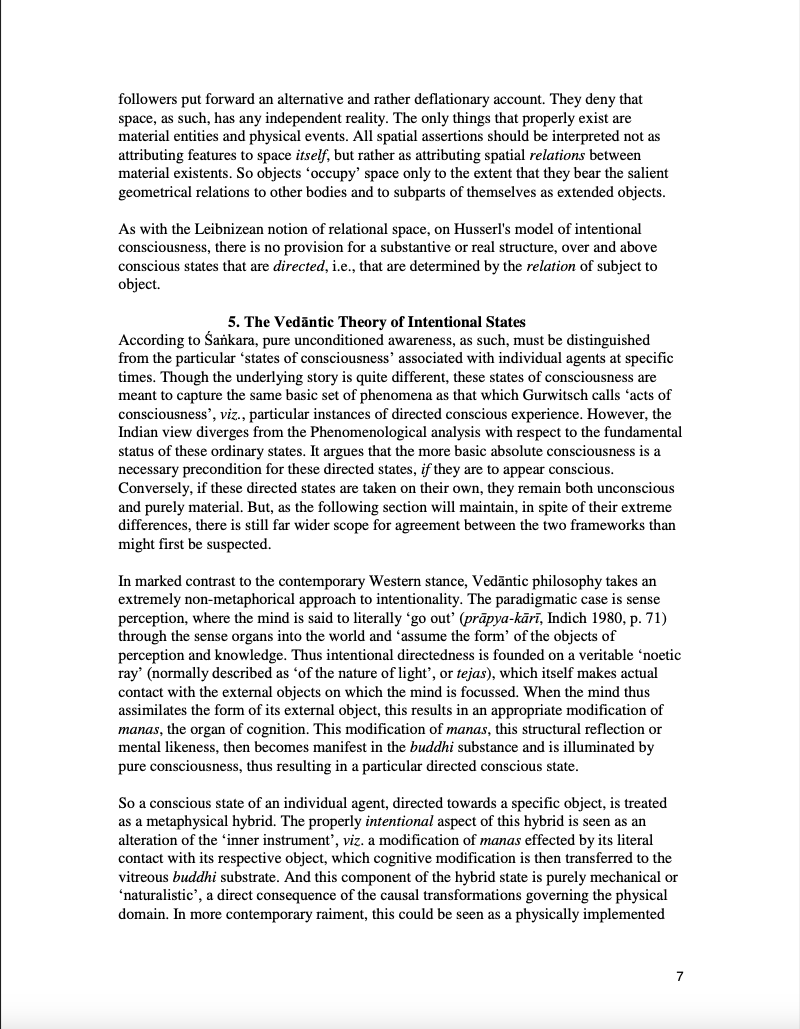
Source: Advaita and the philosophy of consciousness without an object

Source: Advaita and the philosophy of consciousness without an object
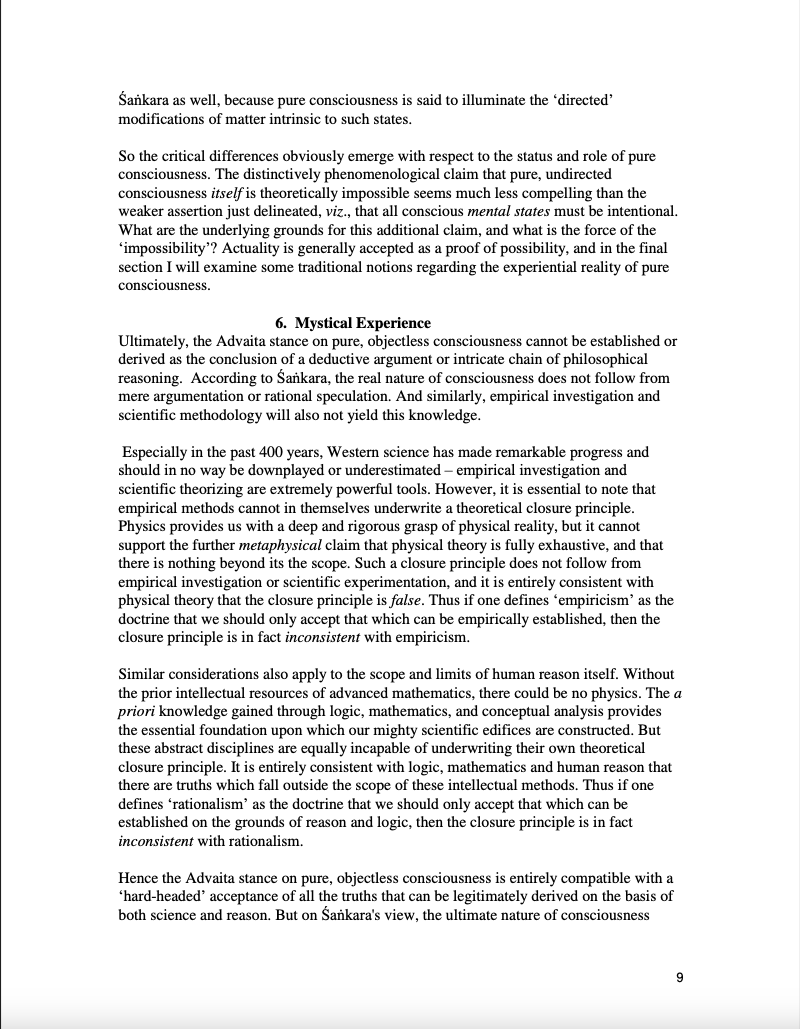
Source: Advaita and the philosophy of consciousness without an object
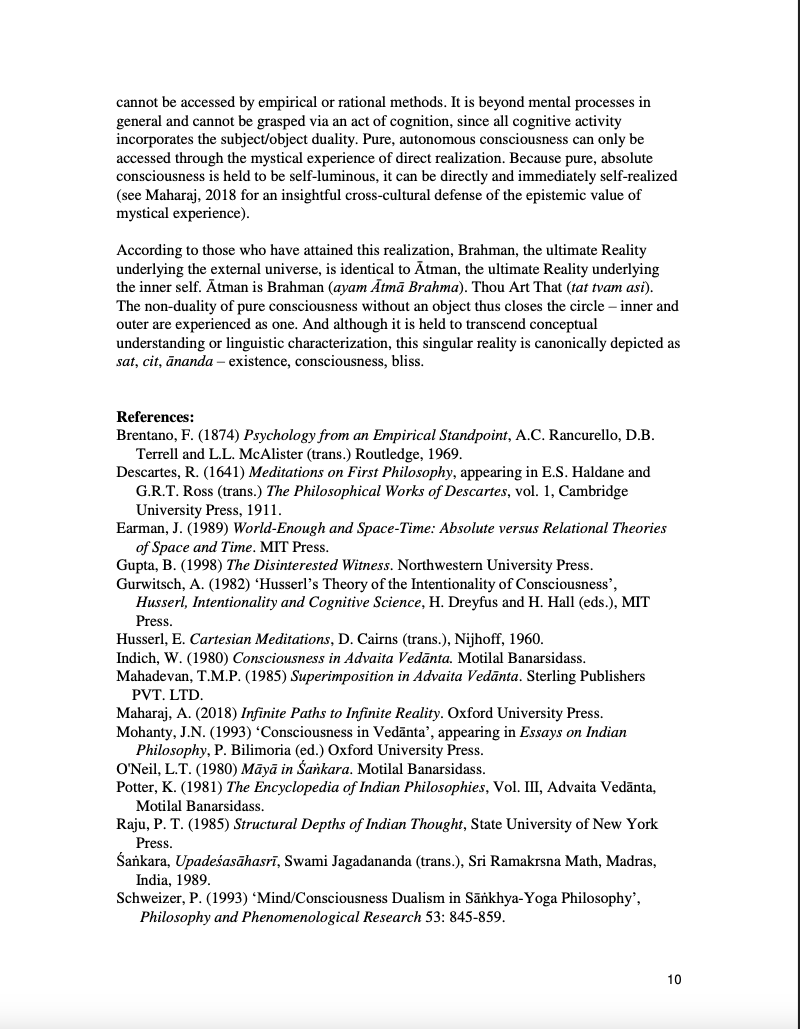
Source: Advaita and the philosophy of consciousness without an object
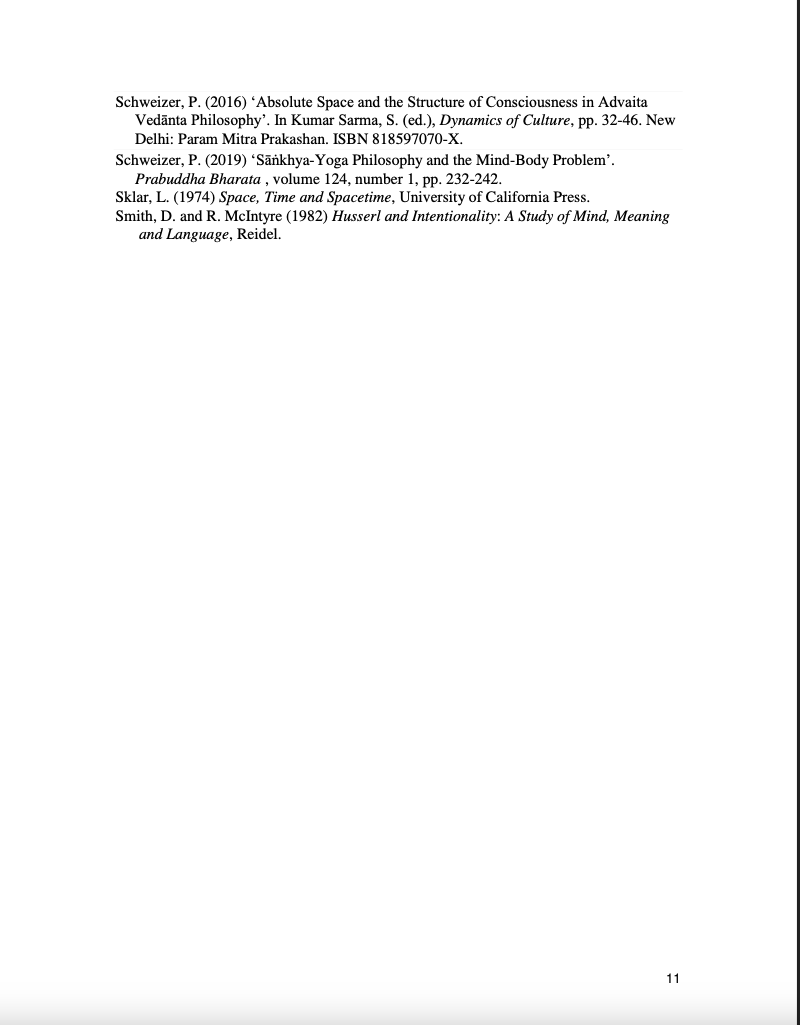
My Related Posts
You can search for these posts using Search Posts feature in the right sidebar.
- Transcendental Self in Kant and Shankara
- Ether in Kant and Akasa in Prasastapada: Philosophy in comparative perspective
- God, Space and Nature
- Purush – The Cosmic Man
- The Transcendental Self
- Ervin Laszlo and the Akashic Field
- Five Types of Systems Philosophy
- Hua Yan Buddhism : Reflecting Mirrors of Reality
- Indira’s Pearls: Apollonian Gasket, Circle and Sphere Packing
- Process Physics, Process Philosophy
- Networks and Boundaries
- Networks and Hierarchies
- Myth of Invariance: Sound, Music, and Recurrent Events and Structures
- Sounds True: Speech, Language, and Communication
- Consciousness of Cosmos: A Fractal, Recursive, Holographic Universe
- Fractal and Multifractal Structures in Cosmology
- Cantor Sets, Sierpinski Carpets, Menger Sponges
- Fractal Geometry and Hindu Temple Architecture
- Rituals | Recursion | Mantras | Meaning : Language and Recursion
- From Systems to Complex Systems
- Hierarchy Theory in Biology, Ecology and Evolution
- Theories of the Self
- Theories of Consciousness
- What is Yogacara Buddhism (Consciousness Only School)?
- Self and Other: Subjectivity and Intersubjectivity
- A Calculus for Self Reference, Autopoiesis, and Indications
- Individual Self, Relational Self, and Collective Self
- Semiotic Self and Dialogic Self
- Drama Therapy: Self in Performance
- Narrative Psychology: Language, Meaning, and Self
- Mind, Consciousness, and Quantum Entanglement
- Geometry of Consciousness
- The Harmonic Origins of the World
- From Individual to Collective Intentionality
- Lifeworld, System, and Intersubjectivity: Jurgen Habermas’ Communication Theory of Society
- Intersubjectivity in Buddhism
- Meditations on Emptiness and Fullness
- Charles Sanders Peirce’s Continuum
- What and Why of Virtue Ethics ?
- The Aesthetics of Charles Sanders Peirce
- Individual, Relational, and Collective Reflexivity
- Semiotics and Systems
- Dialogs and Dialectics
- Phenomenological Sociology
- Phenomenology and Symbolic Interactionism
- Aesthetics and Ethics
- Maha Vakyas: Great Aphorisms in Vedanta
- On Synchronicity
- Truth, Beauty, and Goodness
- Indra’s Net: On Interconnectedness
- On Holons and Holarchy
- Levels of Human Psychological Development in Integral Spiral Dynamics
- The Great Chain of Being
- Cyber-Semiotics: Why Information is not enough
- Integral Philosophy of the Rg Veda: Four Dimensional Man
- Systems View of Life: A Synthesis by Fritjof Capra
- Society as Communication: Social Systems Theory of Niklas Luhmann
- Truth, Beauty, and Goodness: Integral Theory of Ken Wilber
Key Sources of Research
“Mind/Consciousness Dualism in Sā̇ṅkhya-Yoga Philosophy.”
Schweizer, Paul.
Philosophy and Phenomenological Research 53, no. 4 (1993): 845–59. https://doi.org/10.2307/2108256.
https://www.academia.edu/29851642/Mind_Consciousness_Dualism_in_Sankhya_Yoga_Philosophy
Sāṃkhya-Yoga Philosophy and the Mind-Body Problem.
Schweizer, Paul (2019).
Prabuddha Bharata or Awakened India 124 (1):232-242.
https://philarchive.org/rec/SCHSPA-31
The hard problem of ‘pure’ consciousness: Sāṃkhya dualist ontology
Karen O’Brien-Kop
Department of Theology and Religious Studies,
King’s College London, London UK
Email: karen.obrien-kop@kcl.ac.uk
Religious Studies (2024), 60, S4–S20
doi:10.1017/S0034412523000410
Advaita and the philosophy of consciousness without an object
Paul Schweizer
Published 2020
https://www.academia.edu/81836880/Advaita_and_the_philosophy_of_consciousness_without_an_object
Absolute Space and the Structure of Consciousness in Advaita Vedānta Philosophy
Paul Schweizer
Published 2016
“Contemporary Interpretations of Shankara’s Advaita and the Affirmation
of the World.”
Kaipayil, Joseph.
In Reason: Faithful and True (Essays in Honour of George Karuvelil), edited
by Thomas Karimundackal and Dolichan Kollareth, 293-302. Pune: Jnana-Deepa Vidyapeeth, 2020.
https://philarchive.org/archive/KAICIO
Consciousness in Quantum Physics and Meaning in the Advaita Philosophy of Adi Sankaracharya
Chitta Ranjan Sarker, Department of Diploma in Agriculture, Ramjankathi
Technical and Agriculture College, Jhalakathi, Bangladesh
https://utpjournals.press/doi/10.3138/uram.38.1-2.73
Neuroscience of the yogic theory of consciousness
Vaibhav Tripathi1,*,† and Pallavi Bharadwaj2
1Department of Psychological and Brain Sciences, Boston University, Boston, MA 02215, USA;
2Laboratory for Information Design and Systems, Massachusetts Institute of Technology, Cambridge, MA 02139, USA
†Vaibhav Tripathi, http://orcid.org/0000-0001-7520-4188
*Correspondence address. Department of Psychological and Brain Sciences, 64, Cummington Mall, Rm 149, Boston University, Boston, MA 02215, USA.
Tel: +1 857-253-8491; E-mail: vaibhavt@bu.edu
https://www.ncbi.nlm.nih.gov/pmc/articles/PMC8675243
Advaita Vedanta
IEP
Shankara and Indian Philosophy
By Natalia Isayeva
Subjects: Asian Religion And Philosophy
Series: SUNY series in Religious Studies
Paperback : 9780791412824, 285 pages, December 1992
Hardcover : 9780791412817, 285 pages, January 1993
https://sunypress.edu/Books/S/Shankara-and-Indian-Philosophy2
Advaita Vedanta
Wikipedia
https://en.wikipedia.org/wiki/Advaita_Vedanta
Paths to Transcendence: According to Shankara, Ibn Arabi, and Meister Eckhart
Author Reza Shah-Kazemi
Publisher World Wisdom, Inc, 2006
ISBN 0941532976, 9780941532976
Length 262 pages
